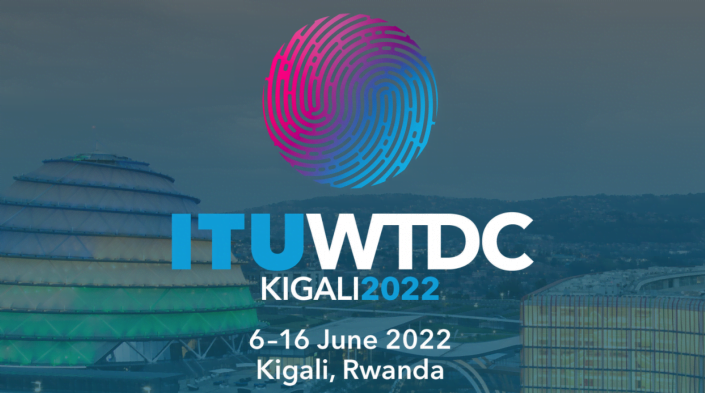ITU World Telecommunication Development Conference (WTDC) “Connecting the unconnected to achieve sustainable development”
The Rwandan capital hosted the World Telecommunication Development Conference (WTDC) from June 6 to 16. Members of the organization, African ministers, development partners and private operators were at the meeting to discuss the theme "Connecting the unconnected to achieve sustainable development". In other words, the digital challenge in Africa.

By Dounia Ben Mohamed, in Kigali
Images and editing Baptiste Habineza
« The immense potential of the Internet for social and economic good remains largely untapped despite 30 years of steady growth.” This is the conclusion of a report by the International Telecommunication Union (ITU), the United Nations specialized agency for information and communication technologies, published at the opening of the ITU World Telecommunication Development Conference, which was held in Kigali from June 6 to 16. According to the Global Connectivity Report 2022, while the number of Internet users has grown from a few million in the early 1990s to nearly five billion today, 2.9 billion people – or about one-third of humanity – remain completely disconnected, and several hundred million more are struggling with costly services and low-quality access that do little to improve their lives materially.
« The conference is “a key time to reflect on the urgency in the post-COVID world where we cannot afford to leave anyone behind »
The report advocates putting »universal and meaningful connectivity » – defined as the possibility of a safe, satisfying, enriching, productive and affordable online experience for everyone – at the centre of global development. This was at the heart of the WTDC discussions. ITU members, ministers from the continent, development partners and private operators were present to discuss the theme « Connecting the unconnected to achieve sustainable development ». In other words, harnessing digital technology for development in Africa, as elsewhere.
As such, this year’s conference is « a key moment to reflect on the urgency in the post-COVID world where we cannot afford to leave anyone behind, » said Paula Ingabire, Minister of ICT and Innovation of Rwanda, host of the event. He highlighted the strategy of the Rwandan government which has placed digital technology at the heart of its development model and achieved visible results. Kigali, a smart city, has, since 2019, smart buses, equipped with free 4G WiFi for passengers. The initiative is part of the Rwandan government’s vision to give every citizen access to the internet.
That vision and model will have been shared with the African delegations participating in the event in order to develop synergies. According to the objective predefined by the organizers: the WTDC 2022 must define the strategies and objectives concerning the development of ICTs by providing guidance and indications to the ITU Telecommunication Development Sector. With the idea of responding to the challenge of « connecting the unconnected to achieve sustainable development », WTDC will also be an opportunity to devise innovative approaches and new models of collaboration in connectivity and digital solutions to achieve the Sustainable Development Goals (SDGs).
« We need to create the right conditions, including promoting environments conducive to investment, to break cycles of exclusion and bring digital transformation to all«
“Equitable access to digital technologies isn’t just a moral responsibility, it’s essential for global prosperity and sustainability,” said ITU Secretary-General Houlin Zhao. “We need to create the right conditions, including promoting environments conducive to investment, to break cycles of exclusion and bring digital transformation to all.”
While the COVID-related surge in demand for Internet access brought some 800 million additional people online, it also dramatically increased the cost of digital exclusion, with those unable to connect abruptly shut out of employment, schooling, access to health advice, financial services, and much more.
“Universal and meaningful connectivity has become the global imperative of our decade,” said Doreen Bogdan-Martin, Director of ITU’s Telecommunication Development Bureau, which produced the report. “It’s no longer just about connecting people – the catalytic role of connectivity will also be absolutely critical to our success in achieving the United Nations Sustainable Development Goals.”
Election of next director of the ITU Council: “It’s time for Africa”
Meanwhile, there was another challenge on the sidelines of the conference: the race for the leadership of the ITU Telecommunication Standardization Bureau for the period 2023-2026 whose election will take place during the next ITU Plenipotentiary Conference, from September 26 to October 14 in Bucharest, Romania.
As such, the candidacy of Tunisian Dr. Bilel Jamoussi, current head of the department of study groups of the office of telecommunications standardization at the ITU, supported by the African Union, is added to Senegal, Morocco, and Ghana. The stakes are high: in case of win, the presidency will be held for the first time by an African. « It’s time for Africa, » said John Omo, Secretary General of the African Telecommunications Union, also supporting Dr. Bilel Jamoussi.






